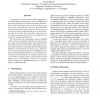Free Online Productivity Tools
i2Speak
i2Symbol
i2OCR
iTex2Img
iWeb2Print
iWeb2Shot
i2Type
iPdf2Split
iPdf2Merge
i2Bopomofo
i2Arabic
i2Style
i2Image
i2PDF
iLatex2Rtf
Sci2ools
104
click to vote
FIMI
2003
2003
A fast APRIORI implementation
The efficiency of frequent itemset mining algorithms is determined mainly by three factors: the way candidates are generated, the data structure that is used and the implementation details. Most papers focus on the first factor, some describe the underlying data structures, but implementation details are almost always neglected. In this paper we show that the effect of implementation can be more important than the selection of the algorithm. Ideas that seem to be quite promising, may turn out to be ineffective if we descend to the implementation level. We theoretically and experimentally analyze APRIORI which is the most established algorithm for frequent itemset mining. Several implementations of the algorithm have been put forward in the last decade. Although they are implementations of the very same algorithm, they display large differences in running time and memory need. In this paper we describe an implementation of APRIORI that outperforms all implementations known to us. We ...
Related Content
| Added | 31 Oct 2010 |
| Updated | 31 Oct 2010 |
| Type | Conference |
| Year | 2003 |
| Where | FIMI |
| Authors | Ferenc Bodon |
Comments (0)

